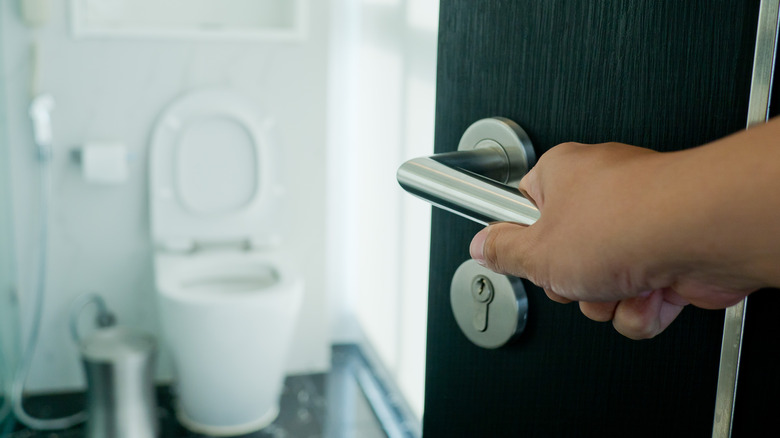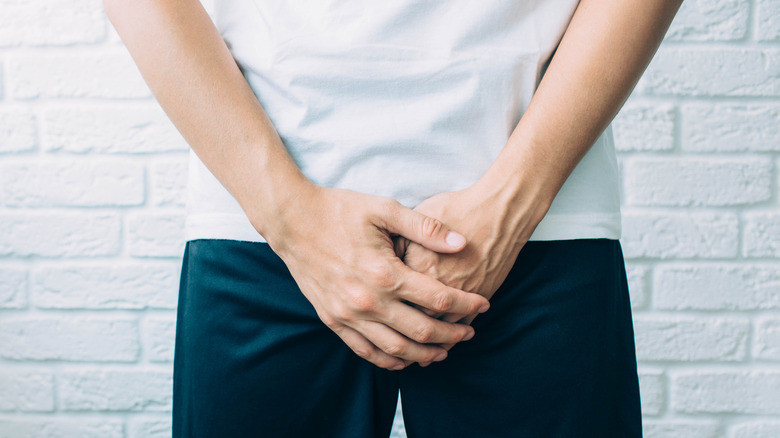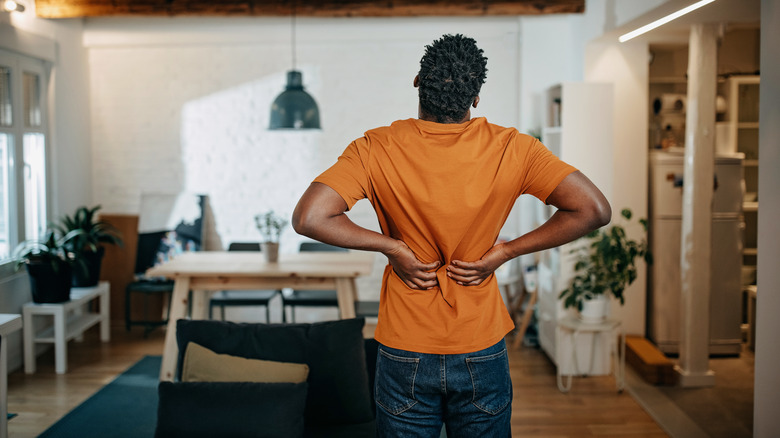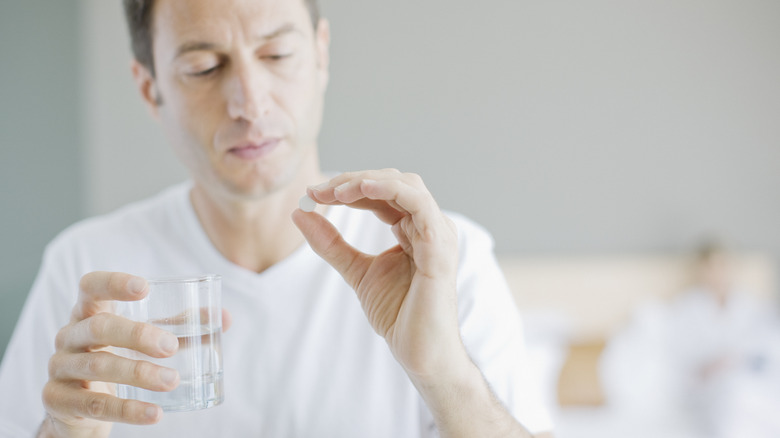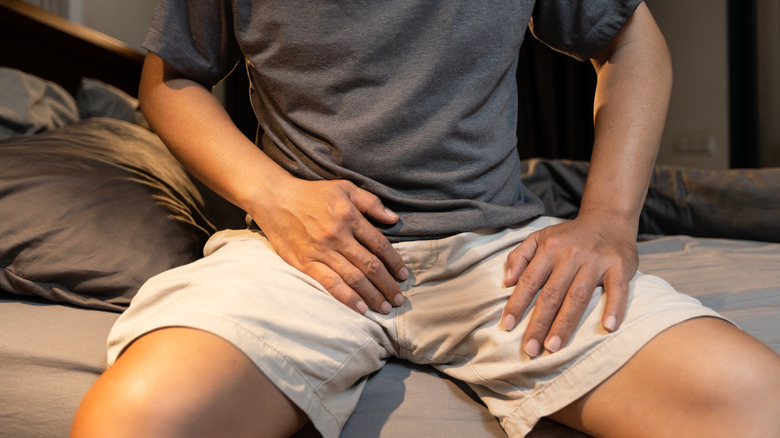What It Means When Men Can't Pee After Sex
Peeing after sex can be useful when it comes to preventing urinary tract infections (UTIs), especially in women. For men, this is less of a concern, mainly because there's less risk of trouble-causing bacteria reaching their bladders, thanks to their longer urethras.
Even so, going to the bathroom after spending intimate time with your significant other is something men might be in the habit of doing. It's a chance to stretch your legs after sex, take a few moments to gather yourself, and perhaps even clean up. But peeing after sex is not always an easy activity, especially if you still have an erection.
This all comes down to the urethra and what it is supposed to do. For men, peeing and semen excretion happen via the same pathway, the urethra. This means one function has to halt for the other to happen successfully. As explained by board-certified urologist and prostate cancer physician Dr. David B. Samadi (via Healthline), "Achieving an erection is for the release of semen during orgasm. To prevent semen from entering into the bladder, the internal urethral sphincter contracts. This not only prevents semen from going into the bladder, but it also prevents urine from passing through the urethra during an erection and ejaculation." So if you're still erect when you're trying to pee, you might run into trouble. But this is a normal reaction to sexual stimulus and isn't a cause for worry. You will be able to urinate when your erection subsides. However, there are pee symptoms men shouldn't ignore.
Prostate problems can lead to issues with peeing
Being diagnosed with an enlarged prostate and having prostatitis can both lead to difficulty when it comes to peeing. Not being able to pee is also one of the sneaky signs you might have prostate cancer.
An enlarged prostate, also referred to as benign prostatic hyperplasia or BPH, is something that happens to most men with age and is thought to be caused by changes in hormones (testosterone) and testicular cells. It is not cancerous and doesn't increase your risk of developing cancer, but it can come with uncomfortable symptoms like dribbling pee, difficulty or inability to pee, urinary frequency, incontinence, a weak urine stream, and painful or bloody urine. These symptoms aren't related to sexual intercourse. Someone with BPH will deal with these complications in general.
An inflamed prostate — prostatitis — can cause painful urination too. Although sometimes brought on by a bacterial infection, prostatitis can occur for other unidentifiable reasons as well. Pain in the perineum, pelvis, genitals, lower back, and buttocks, pain while peeing, and pain while ejaculating are other symptoms of this medical condition.
With prostate cancer, you might experience a weak urine flow, frequent urination (especially at night), a feeling like you're unable to empty your bladder, and blood in your urine or semen, in addition to not being able to pee.
Infections can cause troubles with peeing after sex
UTIs, urethritis, and sexually transmitted infections (STI) can also make it difficult to pee after sex. In fact, UTIs and STIs might also result in your pee burning after sex.
Although more common in women, men can get UTIs too. Again, this isn't related specifically to peeing after sex; UTIs can make it difficult for you to pee in general, along with causing other symptoms like frequent urination, feeling like you have to urinate always, painful urination, stomach pain, cloudy and smelly pee, blood in the urine, fever, and nausea.
With a sexually transmitted infection (STI) — like chlamydia, trichomonas, gonorrhea, and herpes simplex virus — painful urination after sex could occur. You'd likely also experience other symptoms like itching or swelling in the affected area; blisters, bumps, or sores on your penis; bleeding from the penis; yellow, green, or gray discharge; testicle pain; and lower abdominal discomfort.
Urethritis, which is basically an inflammation of the urethra, can be caused by an STI. Injury; sensitivity to contraceptive agents like jellies, soaps, creams, foams, and spermicides; and friction during sex can lead to urethritis too. Urethritis can make peeing after sex difficult and painful. Mucus-like discharge, painful urination, feeling like you need to go all the time, and pelvic pain are also signs of urethritis.
Blockages can cause difficulties with peeing
If you have kidney stones, you could have a stone stuck somewhere in the urethra, ureter, or kidney, making peeing a difficult activity. Ureteral stones can take the form of calcium stones, uric acid stones, struvite stones (composed of magnesium ammonium phosphate and calcium carbon-apatite), and cystine stones. They can manifest in other symptoms in addition to problems with peeing, like severe pain in your upper back that comes and goes, lower abdominal discomfort, nausea, vomiting, bloody pee, and an urgency to urinate frequently.
Severe constipation can be an obstruction too. When your bladder is compressed due to large amounts of waste in your colon, this might hinder the usual pee-filling process and result in difficult urination or not being able to empty your bladder fully.
Underlying health concerns like a urethral stricture and bladder outlet obstruction can cause you to have difficulty peeing as well. Again, these aren't related to peeing after sex alone. A urethral stricture (which is a narrowing of the tube that carries urine caused by scarring) can be a result of medical procedures, trauma to the area, prostate problems, STIs, and radiation therapy. In the case of a bladder outlet obstruction, where the neck at the end of the bladder is blocked, again, a number of things can be at play, like cancer, scar tissue buildup, bladder stones, pelvic organ prolapse, and constipation. Sometimes, the obstruction is something you're born with as is the case with hydronephrosis or spina bifida.
Medications and surgery can cause pee problems too
Medications — like antihistamines, tricyclic antidepressants, antispasmodics, opiates, blood pressure-lowering medications, antipsychotics, muscle relaxants, and NSAIDs — can cause peeing problems as well. Just like some medications cause an overactive bladder, others may disrupt urine flow. They could affect the way your bladder muscles work and thereby cause symptoms that manifest during urination. For example, antihistamines bind to the neurotransmitter acetylcholine involved in muscle contraction and can interrupt the way your gut and bladder muscles work, leading to constipation and urinary retention (where you can't empty your bladder fully). Opioids can affect peeing by binding to receptors that inhibit your parasympathetic nerves.
Hip replacement surgery, spinal surgery, and pelvic surgery can also make it difficult for you to pee. While some of it might be caused by temporary swelling that affects your bladder area, others have to do with anesthesia and what that can do to your spinal nerves and therefore, the act of peeing.
Speaking of nerves, health conditions that affect your nerves — like diabetes, stroke, multiple sclerosis (MS), or a herniated disk — could also cause problems with urination.
What to do about not being able to pee after sex
Unlike with an erect penis and troubles with peeing, most, if not all, the conditions we discussed here aren't only about not being able to pee after sex. The symptoms can occur at other times during the day.
If you do, however, only happen to notice the symptom of not being able to pee after intimate time with your partner, watch and see if it subsides eventually. If the problem continues long after sex, then this warrants a visit with your urologist. As explained by urologist Dr. Karyn S. Eilber (via Cedars Sinai), "People get used to having a weak stream, then all of sudden, they can't pee. If someone notices progressive difficulty urinating, it's important to be seen by a doctor before they are unable to urinate at all."
If your symptom lasts for more than two days or it's accompanied by back pain, fever, nausea, vomiting, bloody or cloudy urine, discharge from the penis, or a frequent need to relieve yourself, these are signs that you're dealing with a medical condition that requires diagnosis and treatment from a health professional. Your doctor will assess the situation by getting a better understanding of your complete history of pee-related problems and do some tests like urine tests, a physical examination, and a digital rectal exam. Treatment will depend on the cause of your urine-related woes.

